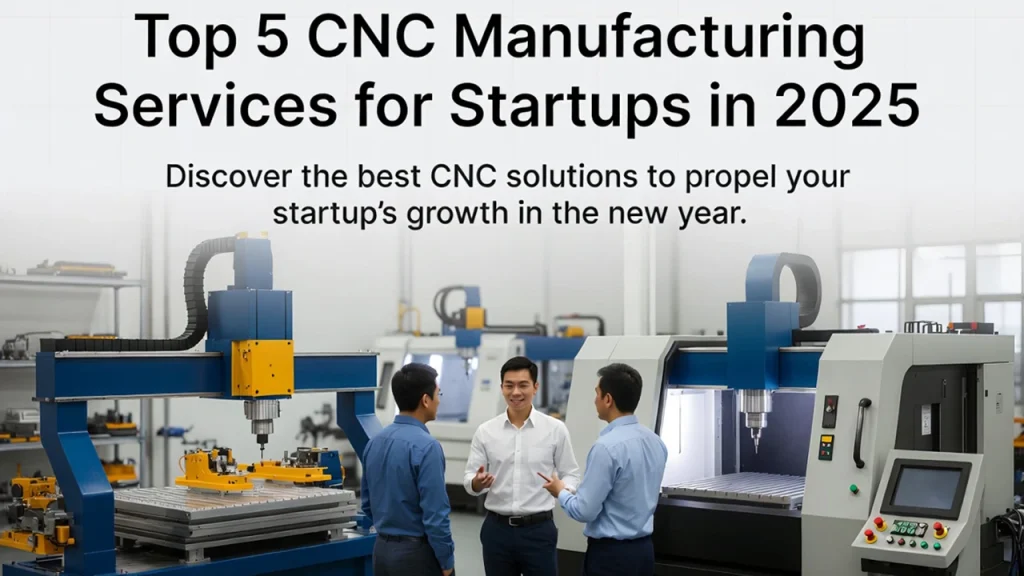 Introduction
Introduction
For startups, especially in hardware, getting a functional prototype quickly—and affordably—is crucial. CNC (Computer Numerical Control) manufacturing is one of the most powerful tools available: it enables precise, production-grade parts from a wide range of materials, allowing fast iteration.
In 2025, the landscape of CNC manufacturing services has matured. Digital-first platforms, global supply chains, and automated quoting make it easier than ever for lean teams to access high-quality parts without massive capital expenditure.
This post explores the top 5 CNC manufacturing services for startups in 2025, highlighting their strengths, trade‑offs, and how to pick the right one.
What Startups Should Consider When Choosing a CNC Service
When comparing CNC providers, startups should think strategically about:
-
Cost-efficiency: How much does each part cost, especially at low volumes?
-
Turnaround time: How fast can you get prototypes for testing, then scale if needed?
-
Material options: Metals (aluminum, steel), plastics (PEEK, ABS), composites—what does each service support?
-
Tolerance & precision: How tight can dimensions be, and does that meet your design needs?
-
Support & insights: Do they provide DFM (Design for Manufacturability) feedback? Quality inspection?
-
Scale potential: Is the provider capable of low-volume production if your product takes off?
Top 5 CNC Manufacturing Services for Startups in 2025
Here are five standout CNC services for startups, each offering something a bit different.
RapidDirect
Why it’s great for startups
RapidDirect is focused on fast prototyping. Its strength lies in speed, broad material offering, and low barrier to entry.
Key Features & Parameters
-
Lead time: as fast as 1 day for CNC prototyping. rapiddirect
-
Material selection: 50+ materials (metals & plastics) for CNC. rapiddirect
-
Max part size: up to 4000 × 1500 × 600 mm for milling; 200 × 500 mm for turning. rapiddirect
-
Tolerance: approximately ±0.001 in per spec. rapiddirect
-
Surface finishes: 30+ finishing options. rapiddirect
Pros for Startups
-
Extremely fast feedback loop: order a prototype, test, iterate.
-
Competitive pricing for single parts.
-
Good for design validation before committing to larger production.
Trade-Offs
-
For very tight tolerances or highly critical features, may not compete with specialized facilities.
-
Shipping costs and lead times if using international facilities may add up (depending on where your startup is).
Protolabs
Why it’s great for startups
Protolabs is a mature, reliable on-demand platform. It shines when you need precision, quality assurance, and a partner that can scale with you.
Key Features & Parameters
-
Online quoting: upload a 3D CAD model, get interactive quote + DFM feedback. protolabs.com+1
-
Lead times:
-
Automated factory: 1–3 days (± 0.005 in) protolabs.com
-
Traditional facility: 4–15 days (± 0.002 in) protolabs.com
-
Networked partner: 5–20+ days (± 0.001 in) protolabs.com
-
-
Material options: more than 30 engineering-grade materials (plastics & metals) protolabs.com
-
Max part size (milling): up to 22 in × 14 in × 3.75 in (559 mm × 356 mm × 95 mm) for in-house; larger via network. protolabs.com
-
Certifications: ISO 9001:2015, AS9100D, ITAR. protolabs.com+1
-
Secondary operations: anodizing, plating, custom finishing, inspection reports. protolabs.com
Pros for Startups
-
Very reliable: strong quality control, documentation, and certifications.
-
Scalable: start with prototype, then move to production via same network.
-
Insightful quoting with DFM feedback helps avoid design mistakes.
Trade-Offs
-
Faster lead times (1–3 days) can be more expensive.
-
For very high quantity production, other sources may be more cost-effective once scale is reached.
Xometry
Why it’s great for startups
Xometry is a massive digital marketplace, connecting you with a large network of CNC shops. This flexibility helps startups access the right shop for their exact needs.
Key Features & Parameters
-
Lead time: starts at ~3 business days, depending on complexity and volume. xometry.com
-
No minimum order quantity (MOQ): you can prototype with 1 piece or scale to volume. xometry.com
-
Material support: 3‑, 4‑, 5‑axis milling capabilities, and many material types. xometry.com
-
Quality control: options include standard inspection, first article inspection, CMM reports. xometry.com
-
Certifications: ISO 9001, ISO 13485, IATF 16949, AS9100D, ITAR. xometry.com
Pros for Startups
-
Flexibility: huge network means many options for cost, speed, and location.
-
Scalability: prototypes and small batches are both supported.
-
Instant quoting tool with DFM warnings helps you catch design issues early.
Trade-Offs
-
Because it’s a marketplace, quality and consistency may vary between suppliers.
-
Lead time depends heavily on which partner shop is selected.
Fictiv
Why it’s great for startups
Fictiv is designed for digital-native manufacturing. Its platform is engineered for speed, precision, and a smooth path from prototype to production.
Key Features & Parameters
-
Lead times: CNC as fast as 2 days in some cases. Fictiv+1
-
For large parts (as of 2025): supports CNC parts up to 10,500 mm (~34 ft) long. PR Newswire
-
Tolerances: standard ISO 2768 medium; with drawing callouts, ±0.001 in (±0.025 mm) possible. Fictiv
-
Very tight tolerance offering: they claim down to ±0.0001 in in some cases. Fictiv+1
-
Materials: 45+ certified materials, both metal and plastic. Fictiv
-
Certifications: ISO 9001:2015, NADCAP, NABL among manufacturing partners. Fictiv
-
Quality & reporting: hand metrology, laser, CMM inspection, GD&T support. Fictiv
-
Lead-time policy: e.g., for 3-day CNC, orders must be placed before cutoff; domestic network has daily scheduling. Fictiv
Pros for Startups
-
Very fast for rapid prototyping with high precision.
-
Platform gives full visibility: instant quotes, DFM feedback, quality reports.
-
Large‑part capability is rare — useful if your startup builds big industrial or aerospace components.
-
Scalable: from 1 piece to very large parts or production — all within one ecosystem.
Trade-Offs
-
Ultra-fast or ultra-high-precision jobs may cost more than more “standard” CNC shops.
-
For very simple, low-complexity parts, the value of deep platform features might be less.
Boona Prototypes
Why it’s great for startups
Boona Prototypes offers one of the fastest CNC services globally, particularly for startups that prioritize speed, engineering support, and flexibility without large minimums.
Key Features & Parameters
-
Lead time: 3 business days for standard CNC prototype orders. Boona Prototypes
-
Tolerances: up to ±0.01 mm (~±0.00039 in). Boona Prototypes
-
Certifications: ISO 9001:2015, ISO 13485 (medical), IATF 16949 (automotive). Boona Prototypes
-
Material options: metals (e.g., aluminum, stainless, tool steel, titanium), plastics (e.g., POM, ABS, nylon, PEEK), wood, composites. Boona Prototypes
-
Max part size: milling up to 4000 × 1500 × 600 mm, turning up to 200 × 500 mm. Boona Prototypes
-
Inspection: offers First Article Inspection (FAI), material certification, capability reports. Boona Prototypes
-
Workflow: CAD upload, instant quote, DFM feedback, rapid production, shipping. As of 2025, Boona advertises a 3-day “no-MOQ” prototype service. Boona Prototypes+1
Pros for Startups
-
Extremely fast turnaround — ideal for tight development cycles.
-
Very low volume risk: No minimums means you can prototype without inventory overhead.
-
Engineering support: Boona provides DFM feedback and works closely to ensure manufacturability.
Trade-Offs
-
For very low-cost simple parts, value might be less compelling compared with ultra-low-cost shops.
-
Shipping from international facilities may introduce transit time, cost, or import risk (depending on your location).
Comparison Table
Here’s a side-by-side comparison of the top 5 CNC services, tailored for startups:
| Provider | Lead Time (Prototype) | Tolerance | Material Range | MOQ / Flexibility | Ideal Use Case |
|---|---|---|---|---|---|
| RapidDirect | ~1 day rapiddirect | ±0.001 in rapiddirect | 50+ materials rapiddirect | Very low, prototyping | Fast design validation & concept testing |
| Protolabs | 1–3 days (factory) / 4–20 days (network) protolabs.com+1 | ±0.005 in (factory) to ±0.001 in (network) protolabs.com | 30+ materials protolabs.com | 1 part or more | Precision prototyping + scalable production |
| Xometry | Starts ~3 business days xometry.com | Depends on shop (varied) | Very broad (3/4/5 axis) xometry.com | 1+ | Flexible sourcing, custom volumes |
| Fictiv | As fast as 2 days Fictiv+1 | ISO 2768 medium standard; ±0.001 in with drawing; ±0.0001 in on some jobs Fictiv | 45+ materials Fictiv | No MOQ | High-precision, rapid prototyping, large-part capabilities |
| Boona | 3 business days Boona Prototypes | ±0.01 mm (~±0.00039 in) Boona Prototypes | Metals, plastics, wood, composites Boona Prototypes | No MOQ (3-day, 1 piece) Boona Prototypes | Speed-critical projects, design iteration, low-volume production |
Tips for Startups When Working with CNC Services
-
Start with a prototype
Use fast-turn services (e.g., RapidDirect or Boona) to validate your design before scaling. -
Leverage DFM feedback
All of these platforms provide design-for-manufacturability feedback. Use it to catch potential problems early. -
Be clear in your CAD
If you need tight tolerances, call them out explicitly in your drawings. Providers like Fictiv and Protolabs respond better when features are clearly defined. -
Consider post-processing
Think ahead about finish: anodizing, plating, painting, etc., and choose a service that supports the finish you need. -
Think about scale
If you foresee higher-volume production, pick a partner that can grow with you (e.g., Protolabs or Fictiv). -
Shipping & logistics
For international providers (e.g., Boona’s China operations), budget for shipping time, customs, and potential import costs.
Conclusion
For startups in 2025, CNC manufacturing is more accessible than ever. Whether you’re racing to build your first prototype or scaling toward production, the five services above provide a compelling mix of speed, quality, and flexibility.
-
RapidDirect and Boona are perfect for fast, low‑risk prototyping.
-
Protolabs offers strong quality assurance and scalable production.
-
Xometry gives flexibility across many suppliers and capabilities.
-
Fictiv stands out for precision, large-part machining, and a fully digital workflow.
By choosing wisely, you can validate your ideas quickly, reduce risk, and maintain agility — all while minimizing upfront manufacturing cost.
FAQs
What is CNC manufacturing, and why is it important for startups?
CNC (Computer Numerical Control) manufacturing uses automated machines to produce precise parts from metals, plastics, or composites. For startups, it allows rapid prototyping, fast iteration, and production-grade quality without investing in expensive equipment.
How fast can I get a prototype from these CNC services?
Lead times vary:
-
RapidDirect: ~1 day
-
Boona Prototypes: 3 business days
-
Fictiv: as fast as 2 days
-
Protolabs: 1–3 days (factory) or 4–20 days (network)
-
Xometry: starts at ~3 business days (depending on shop and complexity)
Can I order just one part, or do I need to meet a minimum quantity?
Most modern CNC services support very low or no minimums:
-
RapidDirect, Boona, Fictiv, and Xometry allow single-part prototyping.
-
Protolabs also supports 1 part for prototype purposes, scaling to larger production as needed.
What materials can I use for CNC prototypes?
Material options are broad: metals (aluminum, steel, titanium), plastics (ABS, PEEK, nylon), composites, and even wood. The exact range depends on the service provider.
How precise are CNC parts from these services?
Tolerance depends on the provider and the complexity of your design:
-
RapidDirect: ±0.001 in
-
Protolabs: ±0.001–0.005 in
-
Xometry: depends on the shop, usually high precision
-
Fictiv: ±0.001 in standard, ±0.0001 in high-precision cases
-
Boona: ±0.01 mm (~±0.00039 in)
Do CNC services provide design feedback?
Yes, most platforms offer DFM (Design for Manufacturability) feedback. This helps you identify potential issues before manufacturing, reducing errors and wasted time.
Can I scale from prototype to production with these services?
Yes, several providers are designed to grow with you:
-
Protolabs and Fictiv offer seamless scaling from prototype to low-volume production.
-
Xometry’s marketplace allows flexible sourcing for different volumes.
Are there certifications for quality assurance?
Many providers offer certifications: ISO 9001, AS9100D, IATF 16949, and ITAR, which ensures high-quality and traceable parts suitable for aerospace, automotive, or medical applications.
Should I consider post-processing like finishing or coating?
Absolutely. Many CNC services provide finishing options such as anodizing, plating, painting, and polishing. Plan your post-processing needs in advance to select the right provider.
What should startups consider when choosing a CNC service?
-
Cost per part and budget constraints
-
Turnaround time for prototypes
-
Material support and part size
-
Tolerance and precision needs
-
DFM support and quality inspection
-
Scalability for future production
-
Shipping logistics and potential import fees



